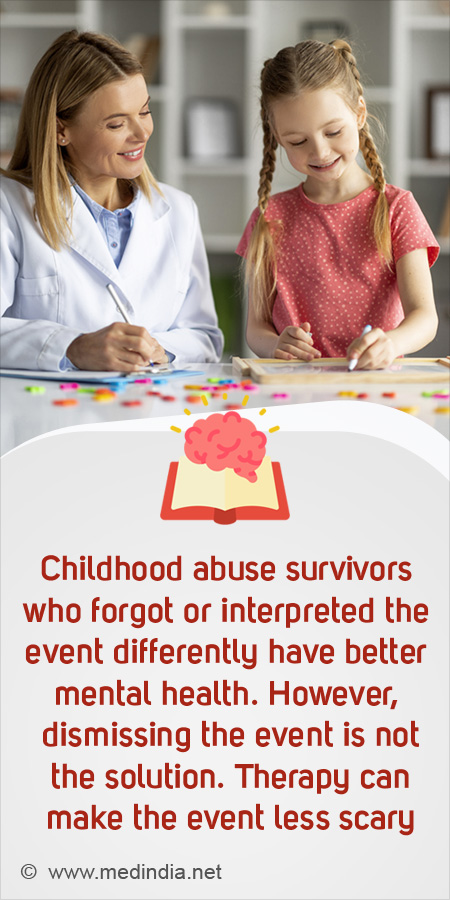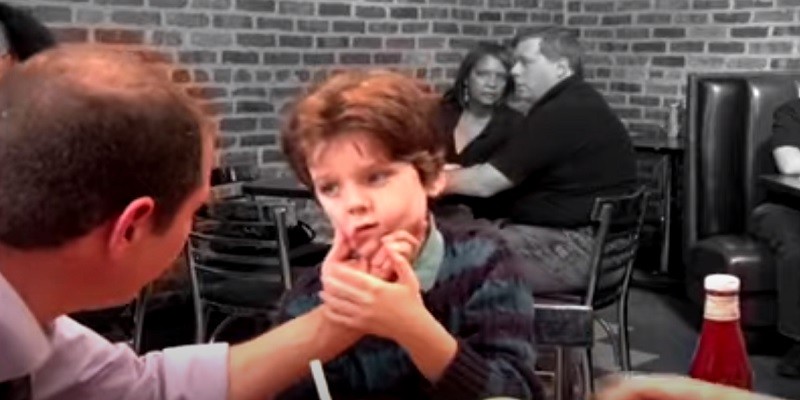Last Updated on January 15, 2025
Child abuse victims are haunted by traumatic memories that can have lasting effects. These memories can resurface and cause emotional distress, impacting various aspects of their lives.
The haunting echoes of childhood abuse can lead to mental health issues such as depression, anxiety, low self-esteem, and difficulties forming and maintaining relationships. It can also manifest as educational challenges and a perpetual sense of fear, isolation, and distrust.
The damaging effects of abuse on a child’s sense of self-worth can linger well into adulthood, resulting in a constant battle to forget and heal from the past. Despite the lingering effects, it is essential to provide support and resources to help child abuse victims overcome their haunting memories and reclaim their lives.
The Lingering Effects Of Childhood Abuse
Child abuse victims are haunted by the memories of their traumatic experiences, according to a new study. The lingering effects of childhood abuse can lead to mental health issues such as depression and anxiety, as well as difficulties forming and maintaining relationships.
Impact Of Childhood Abuse On Victims
Childhood abuse has long-lasting effects on the victims, impacting their overall well-being and quality of life. The experiences of abuse during childhood can shape a person’s thoughts, emotions, and behaviors, often leading to profound difficulties in various aspects of their lives.
Psychological Trauma And Emotional Scars
Child abuse victims often suffer severe psychological trauma and carry emotional scars that haunt them for years. The abuse they endured can disrupt their sense of safety, trust, and self-worth. These deep emotional wounds can manifest as anxiety, depression, post-traumatic stress disorder (PTSD), and other mental health disorders.
Long-term Consequences On Mental Health
The long-term consequences of childhood abuse on mental health are significant. The victims may struggle with low self-esteem, self-doubt, and feelings of worthlessness. They may also experience difficulties in forming and maintaining healthy relationships, as the trauma they endured can affect their ability to trust others and establish emotional connections.
The lingering effects of childhood abuse on mental health can also manifest as educational difficulties and hinder personal and professional growth. Victims may face challenges in concentrating, learning, and achieving their academic or career goals. The emotional distress stemming from their past experiences can often interfere with their ability to focus and succeed.
It is crucial to recognize the long-lasting impact of childhood abuse on the mental health of victims. Providing support, therapy, and resources can help survivors heal and rebuild their lives, ultimately breaking the haunting cycle of abuse.
The Power Of Memory In Haunting
Child abuse victims are haunted by the power of memory, as new studies show. The lingering effects of forgotten maltreatment may emerge, leaving lasting residues on victims’ mental health and well-being.
The Role Of Memory In The Trauma Of Child Abuse
Child abuse is a painful and haunting reality for many individuals. The memories associated with this traumatic experience can have a profound impact on the victims, shaping their emotions, behaviors, and overall well-being. The power of memory in the haunting trauma of child abuse cannot be underestimated.
How Forgotten Maltreatment Can Resurface Through “residues”
One interesting aspect of memory in child abuse is how forgotten maltreatment can resurface through what psychologists refer to as “residues”. These residues are fragments of the past that linger in the subconscious mind, only to resurface later in life. They can manifest as unsettling feelings, sudden emotional reactions, or vivid flashbacks, opening old wounds and reminding victims of the painful experiences they endured.
Understanding the resurfacing of forgotten maltreatment is crucial in helping child abuse victims heal and validate their experiences. It emphasizes the importance of acknowledging the existence of residual memories and providing appropriate support and therapy for those affected.
The Lasting Effect Of Early Abuse On Victims
Child abuse leaves a lasting impact on its victims, extending far beyond the initial trauma. This enduring effect is a result of the profound influence that early abuse has on a person’s psyche and development. It can shape their perception of themselves and the world around them, affecting their self-esteem, relationships, and overall mental well-being.
These long-lasting effects can manifest in various ways, such as chronic anxiety, depression, post-traumatic stress disorder (PTSD), or even difficulties in forming and maintaining healthy relationships. The memories of their abuse act as a powerful force that continues to haunt them, shaping their present experiences and influencing their future trajectories.
It is crucial to recognize and acknowledge the lasting effect that early abuse has on victims. By doing so, we can strive to provide the necessary support and resources to help them heal, recover, and lead fulfilling lives.
Healing And Moving Forward
Child abuse victims are haunted by painful memories that can deeply affect their lives. A new study suggests that forgotten maltreatment can have lasting impacts, surfacing as “residues” in later years. It is important to understand and address these haunting memories to support healing and moving forward.
Coping Mechanisms For Child Abuse Survivors
Child abuse survivors often develop coping mechanisms to deal with the haunting memories and trauma they have endured. These coping mechanisms can help them navigate through difficult emotions and find healing and stability. Here are three commonly used coping mechanisms for child abuse survivors:
1. Self-care: Engaging in self-care practices can be instrumental in healing and moving forward for child abuse survivors. This can involve activities such as exercise, meditation, journaling, or engaging in hobbies that bring joy and relaxation. Self-care allows survivors to prioritize their well-being and develop a positive relationship with themselves.
2. Building a support network: Surrounding oneself with a supportive network of friends, family, or even support groups can provide a healing space for child abuse survivors. Having a safe and non-judgmental environment where survivors can share their experiences, receive validation, and find empathy can be immensely helpful in their healing journey.
3. Therapy and counseling: Seeking professional help is crucial for child abuse survivors to address their trauma and work toward healing. Therapists and counselors specialized in trauma can assist survivors in processing their emotions, building resilience, and developing healthy coping mechanisms. Therapy can provide survivors with the necessary tools and guidance to overcome their haunting memories and move forward.
Overcoming The Haunting Memories
The haunting memories of child abuse can deeply impact survivors’ lives and hinder their ability to move forward. However, there are strategies that child abuse survivors can employ to overcome these memories and reclaim their lives:
1. Acceptance and validation: Recognizing and accepting the memories of abuse as real and valid experiences is an essential step in the healing process. It is crucial for survivors to acknowledge their pain and validate their own emotions, allowing themselves to grieve and heal.
2. Processing emotions: Working through the intense emotions associated with traumatic memories is an important aspect of overcoming them. This can be achieved through therapy, where survivors learn healthy ways to express and manage their emotions. Engaging in activities such as art therapy or mindfulness exercises can also aid in the processing of emotions.
3. Reframing and rewriting the narrative: Child abuse survivors can regain power over their memories by reframing their experiences and creating empowering narratives. This involves challenging distorted beliefs and negative self-perceptions that may have been ingrained by the abuse. With the help of therapy or counseling, survivors can develop a new perspective that focuses on resilience, growth, and personal strength.
Seeking Professional Help And Support
When it comes to healing and moving forward from child abuse, seeking professional help and support is crucial. Professional intervention can provide survivors with the guidance, understanding, and specialized care they need to navigate their healing journey. Here are some essential avenues for seeking help:
1. Therapy and counseling: Finding a trauma-informed therapist or counselor who specializes in working with child abuse survivors can be immensely beneficial. They can provide a safe space for survivors to share their experiences, process their emotions, and learn coping strategies to move forward.
2. Support groups: Joining a support group specifically designed for child abuse survivors can offer a sense of community and understanding. These groups allow survivors to connect with others who have had similar experiences, share insights, and receive support from individuals who have firsthand knowledge of the challenges they face.
3. Hotlines and helplines: Various hotlines and helplines exist to provide immediate support and guidance for child abuse survivors. These resources can offer a listening ear, provide information about available services, and connect survivors with appropriate professional help if needed.
By adopting coping mechanisms, addressing haunting memories, and seeking professional help, child abuse survivors can begin the healing process and move forward toward a brighter, empowered future.

Credit: www.medindia.net
Frequently Asked Questions On What Haunts Child Abuse Victims?
How Does An Abusive Childhood Affect Adulthood?
Childhood abuse can have long-lasting effects on adults, including psychological consequences like educational difficulties, low self-esteem, depression, and relationship challenges. Victims may experience feelings of isolation, fear, and distrust, impacting their overall well-being. Coping mechanisms such as repression, denial, and dissociation are often used by trauma survivors to defend against intrusive thoughts and emotions.
What Are The Common Defenses For Trauma Survivors?
Common defenses for trauma survivors include repression, denial, and dissociation. These coping mechanisms help them defend against painful thoughts and feelings. Adult survivors of childhood abuse often use these defenses to protect themselves.
How Does Childhood Abuse Continue To Haunt Victims?
Childhood abuse can leave lasting memories, causing victims to experience emotional distress and trauma throughout their lives.
Why Do Childhood Traumas Suddenly Resurface And Haunt Me?
Childhood traumas may resurface later in life due to triggers or unresolved emotions, leading to haunting memories and emotional distress.
Are Nightmares Of Child Abuse Common Among Adult Survivors?
Many adult survivors of childhood sexual abuse often experience nightmares, which can be a haunting reminder of their past trauma.
Conclusion
Child abuse victims carry the haunting memories of their past deep within their souls. These memories can manifest in various ways throughout their lives, causing lifelong psychological consequences. Maltreatment during childhood can lead to feelings of isolation, fear, and distrust, which may result in difficulties in education, low self-esteem, and challenges in forming and maintaining relationships.
The long-term effects of child abuse cannot be underestimated. It is crucial that we provide support and resources for these victims, helping them heal and find a sense of peace and security in their lives.

